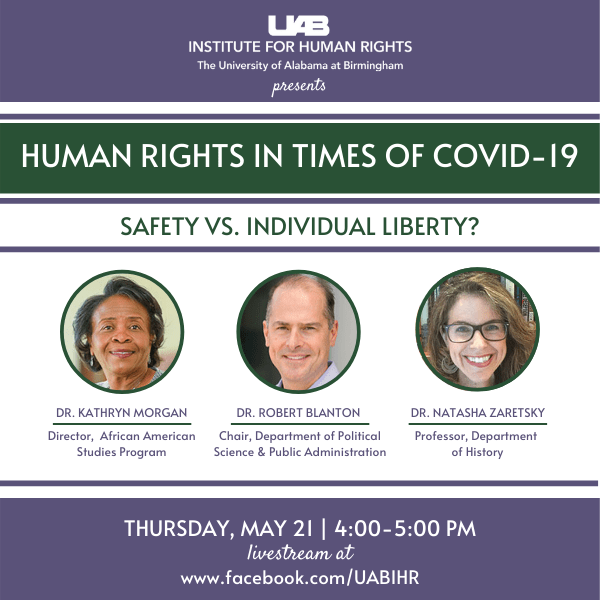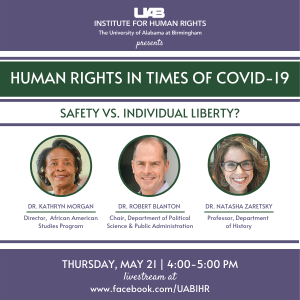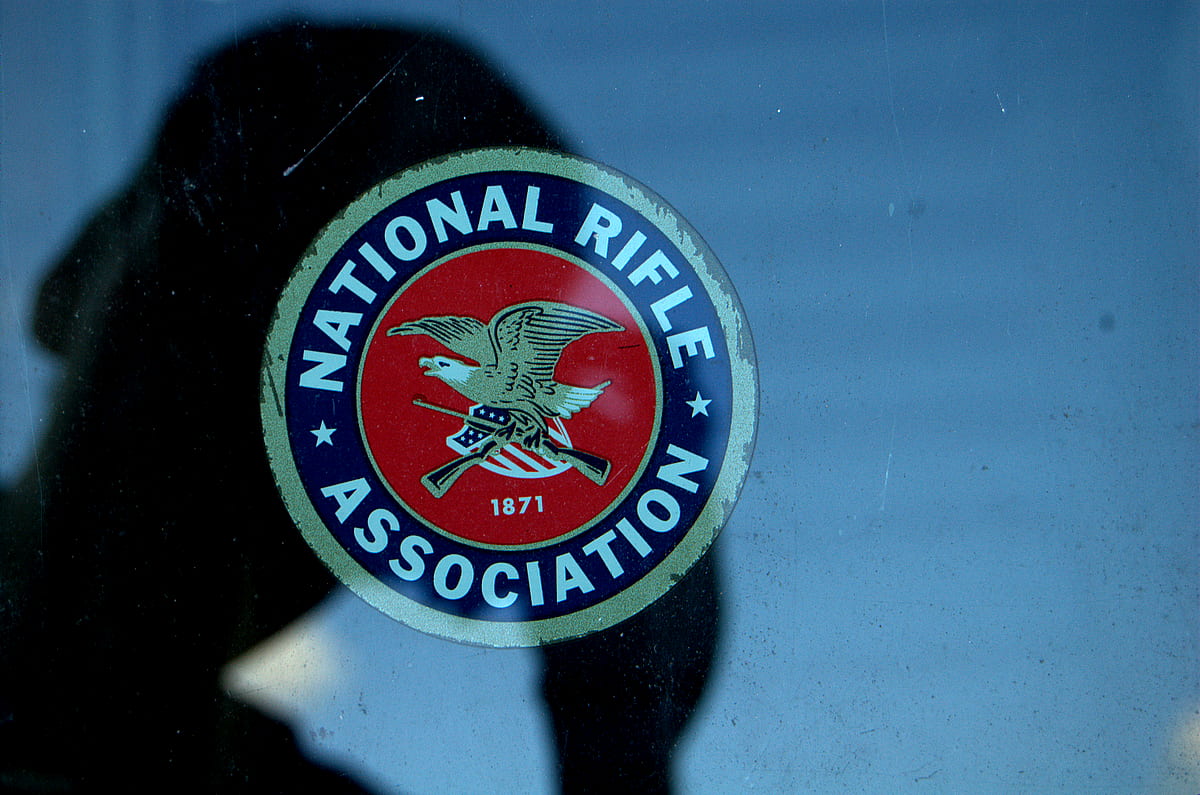The tension between the authority of governments to impede on individual rights in times of public emergencies and the implications for human rights is a topic that has come into focus as the world reels from the impacts of COVID-19. On Thursday, May 21, the Institute for Human Rights hosted its first webinar on Human Rights in Times of Covid-19, which focused on how we navigate this tension between public safety and individual liberty. Our panelists included Dr. Kathryn Morgan, the Director of the African American Studies Program at UAB and an expert in civil rights, race, and criminal justice policy, Dr. Natasha Zaretsky, a Professor of History at UAB who focuses on contemporary U.S. culture and intersecting histories of women, gender, and families, and Dr. Robert Blanton, the Chair of Political Science and Public Administration at UAB who specializes in international human rights with a focus on human trafficking. We are grateful to our panelists for taking the time to share their expertise on this topic as we navigate this difficult time, and we’re grateful to the UAB/IHR community for your interest and engagement. If you missed the webinar and would like to watch it in its entirety you can find it here. Below is a recap of the event.
Dr. Morgan focused on the implications of this tension for civil rights in the U.S., reminding us that governments do have the authority and the responsibility during a pandemic to impose restrictions on certain rights afforded by the Constitution in order to keep the most people safe. However, as we are seeing, this is not a cut and dry issue, and there is a lot of disagreement over how to keep people safe and keep the economy functioning. To this end, she mentioned three major concerns: one, what kind of restrictions will be put in place?, two, how long will this go on?, and three, how will these measures be enforced? She also mentioned the variable impact these restrictions and the virus itself will have on different sectors of the population, pointing out how this virus is disproportionately affecting black and brown people who are dying at much higher rates than white people. Dr. Morgan also expressed concern over how federal and state responses to the virus will impact people with disabilities, suggesting that times like this often exacerbate discrimination against these vulnerable populations.
“When we look at service workers. When we look at people who are in essential positions that help to keep society running, even in a shutdown. Many of those people are from marginalized groups. They are exposed to conditions that really exacerbate the problems of exposure to the coronavirus.”
Dr. Zaretsky discussed the way that partisan division and hostility are shaping this conversation around individual liberties and public health, comparing it to the debate over vaccinations in the U.S. On the one hand, people want and need to work, but at the same time, we see that social distancing and work from home measures are effective in slowing the spread of the virus. And while this seems like a particularly loud and divisive situation, one that the Trump administration is actively inciting, Dr. Zaretsky reminded us that the media is proliferating the opinions at the polar ends of the spectrum, which likely do not represent the views of most Americans. While lockdown protestors are demanding that the economy be reopened so that they can get haircuts and pedicures, it doesn’t seem like they’re considering that this requires other people to risk exposure to the virus so that they can perform these services. What is important to remember is how interconnected we all are. However, in the absence of no comprehensive national plan to end the pandemic, the rampant spread of misinformation, and the politicization of masks and other safety measures, we are left with division and hostility rather than a sense of unity toward a common goal of resolving this crisis.
“In the context of this pandemic, there is no such thing as individual liberty…it is bringing into view how profoundly interconnected we all are.”
Dr. Blanton spoke of how this tension is playing out on the global stage and how different nations are regarding their human rights commitments during this time. In balancing the human rights with the public good, international law provides a set of standards that calls for restrictions to be necessary, proportionate and non-discriminatory in nature. Of course restrictions on the freedom from things like arbitrary imprisonment or torture should never be lifted under any circumstances. However, Dr. Blanton mentioned what he called “coronavirus coups” happening in places like Hungary, where democratically-elected presidents are using the pandemic to suspend elections and appointment themselves rulers for an indefinite period of time. Other governments have used the pandemic to undermine civil society by using emergency powers to detain journalists and activists and health care workers who criticize the government. In moving forward, Dr. Blanton stressed that the “protection of human rights should not be viewed as an impediment to handling the crisis so much as an essential component of an effective response.”
“Several countries have used the pandemic as an excuse to undermine the rule of law or undermine democratic processes.”
Community questions
We were pleased to have so much engagement from community members who sent in questions on Facebook for our panelists to address. Here are some of the questions and the responses:
Would you say now is a good time for the U.S. to join the United Nations in guaranteeing health care and food as positive human rights?
Dr. Blanton responded to this by saying that this crisis has brought into focus the mediocre job our country does in providing the positive rights, including health care. This has shown the weakness in our existing power structure in that the federal government is pushing to centralize power around the pandemic but at the same time is not able or is not willing to provide the goods and services that states need to combat the virus. He said the U.S. is unusual in its position on not identifying healthcare as a human right, though this is clearly something that needs to change.
Dr. Zaretsky also touched on how this crisis has exposed and exacerbated the pitfalls of the health care system, expressing a cautious optimism that this may serve as an impetus to reframe the healthcare debate in a way that makes forging comprehensive and long-term policy changes possible. Again, this is an example of how the extreme positions have been foregrounded and the wants and needs of the majority go unaccounted for. But there is no denying anymore that changes must be made going forward.
What about labor rights? They are always tennis to non-existent in the U.S., but especially hard-hit right now as the U.S. and other countries like them slide further under the rug, risking worker safety while they’re at it as part of their coronavirus response.
In addition to the weakness of our labor unions in the U.S., we fall behind other developed countries in terms of wage levels and working conditions. The crisis is bringing a lot of attention to that, but Dr. Blanton is not terribly optimistic that anything will come of it. The problem is that this requires hefty structural change, not just short-term attention. Dr. Zaretsky pointed out that there have been several labor uprisings during all this – at Amazon and Instacart for example – but these don’t get a whole lot of attention in the media. The focus is largely on militia groups storming the capitols, and the concerns of workers are getting lost in the shuffle.
It’s easy to think of the two sides during this pandemic as people who resent not being able to shop or eat versus people who are afraid that they will die, but how do you draw the line between what different groups want and how do you decide which voices are listened to? How can a government make both sides feel that they’re being heard? Is there a way to defuse this resentment?
A big part of this problem, according to Dr. Zaretsky, is that the Trump administration is ratcheting up this animosity by using divisive rhetoric rather than trying to rally people around a common cause. Trump is pitching this as a populist class struggle, and this narrative is dominating the media coverage. This is unfortunate because while there are differences in how Republicans and Democrats think this needs to be handled, the majority of Americans on both sides are in agreement about the need to take the virus seriously and are trying to do what they can to stop the spread.
We are grateful to our panelists and to all the community members who joined us for the webinar. If you missed the event, you can check out the recording on our Facebook page.




